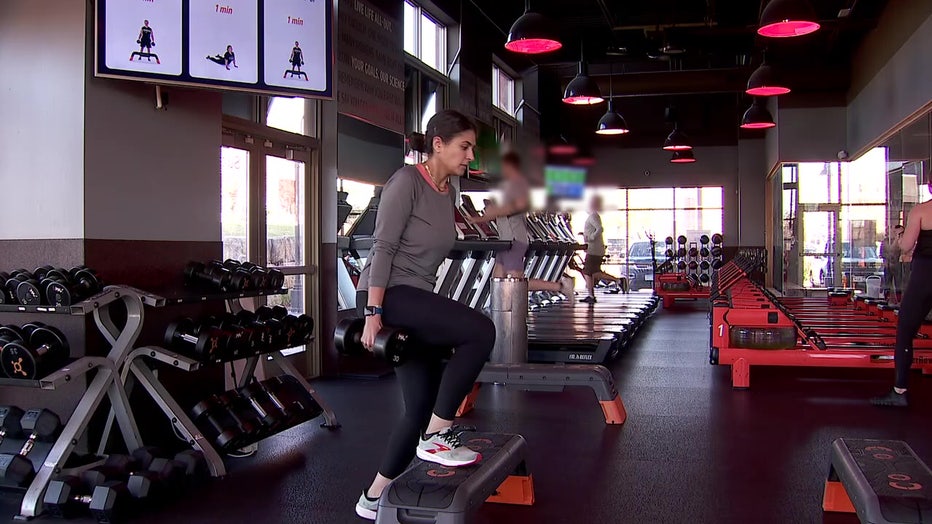Allergic to working out: Living with exercise-induced anaphylaxis
Minnesota woman allergic to physical activity
A woman from Plymouth has a condition that makes her allergic to exercising, causing it to possibly be deadly. FOX 9's Leah Beno has the latest.
PLYMOUTH, Minn. (FOX 9) - A Plymouth, Minnesota, woman faces an unusual and life-threatening condition that makes exercising a potentially deadly activity for her.
Background
"I'm allergic to working out. The usual response is, ‘Ha ha, me too! Right?' People love to say that; it’s a joke, I’ve heard it a million times," says Maggie Habashy. "But no, it’s like, literally, it could kill me."
Often trying to mask her fears and frustrations with a smile, Maggie Habashy of Plymouth is diagnosed with exercise-induced anaphylaxis. It’s the same sort of severe allergic response that can cause symptoms ranging from vomiting to hives to someone’s throat swelling up—and even death. Habashy now carries two doses of epinephrine, just in case life-saving measures are needed. Her extremely rare condition started about a decade ago, after the birth of her first child and the onset of milder symptoms.

How it started
"I went out for my first run after I had her; it was a couple of months after, and I just felt really itchy," says Habashy. "I realized my whole body was covered in hives, and so I was like, okay, this is kind of weird, maybe something environmental. I’m not really sure what. I didn’t actually, like, think about it too much. And then it kept happening. But not only did it keep happening, it kept getting worse."
Periodically, Habashy would attempt a run or a partial workout class and have to stop because her eyes would start to swell shut, along with itching on her torso and hives. Over the years, she’s been through test after test with different allergists. Habashy’s allergist, Dr. Micah Karasov with Advancement in Allergy and Asthma Care Ltd., points out this case is even more unique because it’s not related to food allergies.
"Most people, there is a food trigger that as long as they avoid the food, whether it’s wheat or soy or whatever, as long as they don’t eat that for, let’s say, 2 to 4 hours before exercise, they’re not going to react," says Dr. Karasov. "Maggie’s case is unique in that there was clearly not a food trigger because she was fasting during the time."
Last year during Ramadan, when Habashy was already not eating for hours prior to working out, 20 minutes into a class, she started to feel that dreaded itchiness – but this time in her throat. She called her husband, and both rushed to the nearest emergency room.
"He could see my whole face was swollen up. I couldn’t talk, and the doctor, she asked him, ‘Has this ever happened?’ He said she’s gotten allergic reactions before from working out, but definitely nothing like this," says Habashy. "He said the doctor looked really scared, and she said, ‘I don’t know what would have happened if she would have waited ten minutes.’"
"It’s like constant fear, all the time," says Noor Balshe. Balshe can relate to some of what Habashy is going through. She has a lot of food allergies, but last year, she was diagnosed with exercise-induced anaphylaxis during her senior year of high school and struggled to get through every soccer game.
"I would have games later at night, and I would just skip breakfast; lunch would maybe be a few sips of water earlier in the day, and then that was it," says Balshe. "I would eat after my games. I never eat anything."
Living with the condition
When we were invited to tag along with Habashy for a workout class, 15 minutes in, she had to stop. As her heart rate went up, the itchiness, followed by numbness starting in the roof of her mouth, kicked in – not worth the weightlifting she enjoys.
"Sometimes I make it 15 minutes, sometimes I make it 45. It just kind of depends on the day," says Habashy. "Some days are more emotional than others. I get frustrated that I can’t finish it, but I just do the best I can and move on."
While there could be other triggers, ranging from a common cold to menstrual cycles, Dr. Karasov reminds us it’s most important for anyone with this condition to listen to their bodies and be prepared.
"Always, always, always, always, always carry EpiPens and stop exercising if you start having a reaction, because that’s almost like a natural medicine for this type of condition where if you stop exercising early enough, the reaction is going to be more likely to stay mild," says Dr. Karasov.
This time, Habashy’s reaction was relatively mild. Yet the balance between what’s healthy for her body and what isn’t continues.
"I hope to connect with anyone else who is maybe struggling," says Habashy. "That’s a big thing—you feel so isolated not being able to have control of how your body might react to something."

